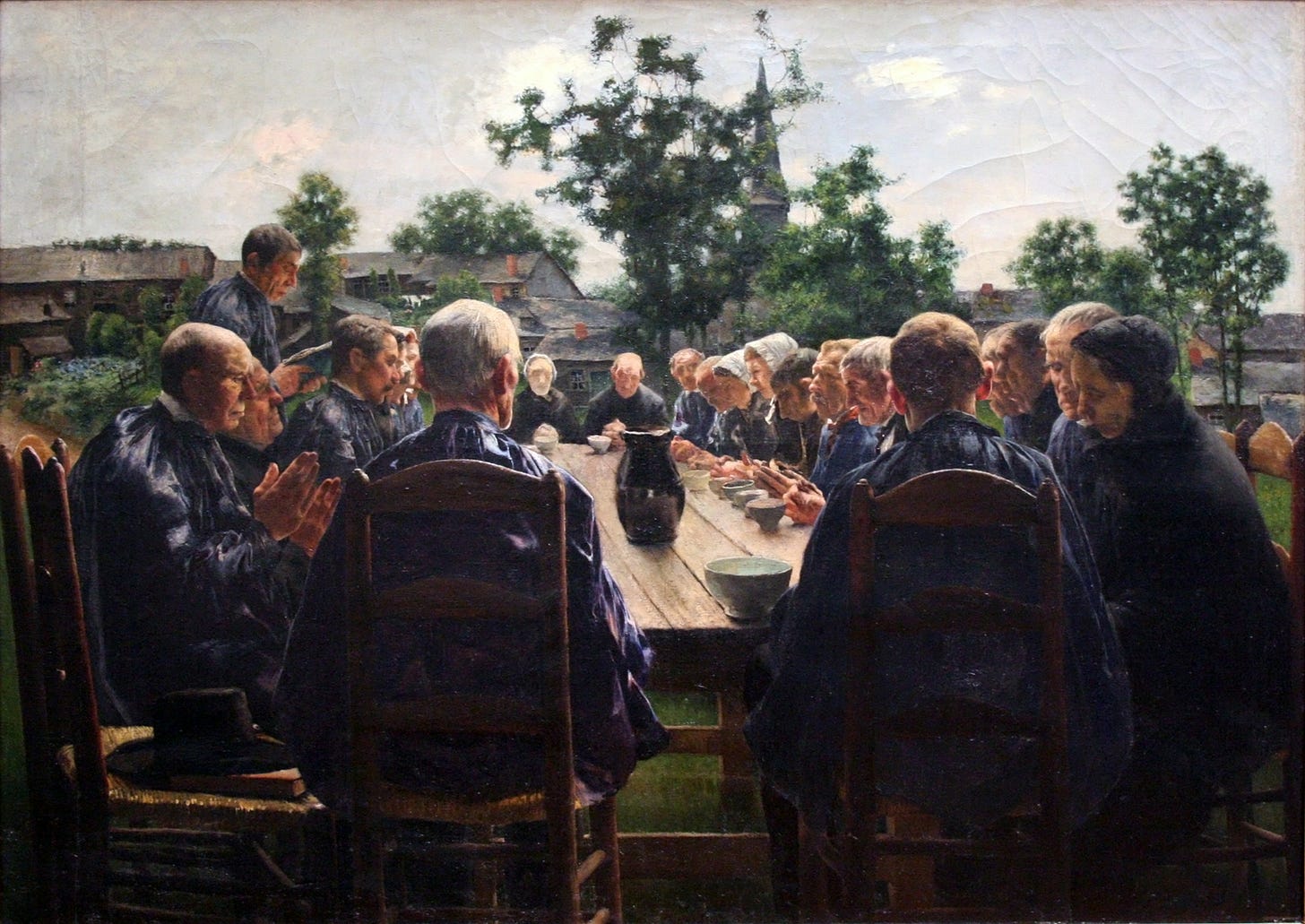Joy at the Potluck of Sorrows
Some fragmented thoughts on "hope you are well," autumn leaves and tulip bulbs, sustenance amidst suffering, and a song about love
Friday, October 27
Grand Rapids, Mich.
“Hope you are well.”
Sometimes I write these words, and sometimes I receive them. They come at the beginnings of emails, and they are tucked in at the end. I suppose these four words have almost become a written substitute for the “How are you?” that you might give or get at, say, the grocery-store checkout or church coffee hour. Is that intended as a real inquiry? Is this more than a casual hope?
Yesterday, I wrote back to an acquaintance who had, in a work-related email, expressed her hope that I was well: “All things considered and with all the sorrows in the world, I am okay.” I don’t know if she wanted or expected a response, but there was mine. I couldn’t bring myself to say that I’m well, not exactly in those words. How could I, when so many of my neighbors are not? How could I, when emails and the texts from friends and loved ones keep coming, reporting a relative’s death and the loss of a job, fractured relationship and faltering spirits, struggles with faith and the tribulations of parenting? How could any of us, truly, when so much of this world is aching and so many people are crying out?

No, I am not well, and the world is not well, but with all the sorrows in the world, I am okay. As I was sitting here at my desk, thinking about my okay-ness, my mental jukebox malfunctioned, and a song that was popular during my childhood popped into my head: Bobby McFerrin’s “Don’t Worry, Be Happy.”
I’ve always hated that song, and I’ve always been puzzled by its popularity. The way the song whistles and bops its way to alleged happiness—so annoying. Why would anybody take comfort in its emotional bypassing? Where is the solace in its blithe dismissal of very real frustrations and anxieties? What does it say about our world that it hit No. 1 not just in the U.S. but in six other countries? Come on, Iceland. Really? (Intriguingly, the song peaked at No. 29 in France.)
I needed to shut my brain off—or at least cleanse my mental playlist. So I went out to the yard with Fozzie.
The stately maple in front of our house has unfurled the autumn carpet—yellows deepening to orange and on into the reds—and Fozz loves trundling through the fallen leaves. We plan to let most of those leaves be, though we might pile some in the garden beds to serve as mulch. A pristine lawn has never been one of our priorities. Much better that the leaves provide some winter shelter for insects, which in turn will feed the chipmunks and the birds. Much better that the leaves make their afterlife in the nourishment of the soil right outside our house than in some distant landfill.
Right now, I need the sermon series that the fallen leaves and the near-invisible creatures and the ever-changing soil preach—their reminders of the resilience of life, their wisdom about the interconnectedness of things, their teachings about mutuality. Sure, they invite me to participate. But so much is beyond me, and their grace offers me more than I give them: their proof of nature’s wonders, their demonstrations of death begetting new life, their manifestations of little miracles.
Our tulip and narcissus bulbs arrived a couple of weeks ago, and they’ve just been sitting in our house, waiting to be attended to. While Fozzie wandered the yard, I dug and planted, dug and planted, until a blister formed on the palm of my hand. All the while, I thought about these little containers of possibility. For months, it will seem as if nothing is happening. Then, come spring, we’ll spot some green sprouts, then eventually a bud, then eventually a bloom.
Right now, I need the sermon series that the tulips and the narcissi preach—their advice about active waiting, their counsel toward studied patience, their testimonies about the seasons. Sure, they ask me to do my part, nestling them into good soil. But so much is beyond me, and their grace offers me more than I give them: their stories of transplantation and taking root wherever they’re planted, their quiet witness to processes of growth that we cannot see, their promise of coming beauty.
I confess that, while I was sitting at my desk beforehand, I’d also been doomscrolling on social media and reading news story after news story about the woes of the world: Israel and Palestine, Maine, a deadly hurricane in Mexico that didn’t even make the front page because so much else was going on, Ukraine, Sudan, the aftermath of devastating earthquakes in Afghanistan, yet another heart-rending narrative about a family’s perilous journey out of Venezuela, a clip from the archives of a column that the new speaker of the U.S. House once wrote in which he described marriages like mine as “the dark harbinger of chaos and sexual anarchy that could doom even the strongest republic.”
Right now, I need the sermon series that the fallen leaves and the near-invisible creatures and the ever-changing soil and the tulips and the narcissi preach, because I need to be reminded of grace that is beyond us and of power that is greater than us. How does one stay attentive to the suffering of the world while not being crushed by it? How does one bear witness and offer encouragement while not falling into despair? I don’t think I can, at least not on my own.
In the midst of World War II, Dietrich Bonhoeffer wrote to his friends to share some reflections on suffering and joy. He reflected on an escapist kind of joy “that knows nothing at all of the heart’s pain, anguish, and dread; it does not last; it can only numb a person for the moment,” and he contrasted it with joy rooted in the divine and embodied in a Jesus who had “gone through the poverty of the manger and the agony of the cross.” This kind of expansive, hospitable joy, Bonhoeffer argued, “does not deny the anguish, when it is there, but finds God in the midst of it, in fact precisely there; it does not deny grave sin but finds forgiveness precisely in this way; it looks death straight in the eye, but it finds life precisely within it.”
This is joy cultivated not as anesthetic or palliative but as empowerment and sustenance. I think we can only find it beyond us, in the company of others, human and non-.
In his profoundly gorgeous book Inciting Joy, Ross Gay writes: “My hunch is that joy is an ember for or precursor to wild and unpredictable and transgressive and unboundaried solidarity.” He imagines what might happen if humans—fallible humans, flawed humans, hopeful humans, sad humans—gathered for what he calls “a potluck of sorrows.” “My hunch is that joy, emerging from our common sorrow—which does not necessarily mean that we have the same sorrows, but that we, in common, sorrow—might draw us together. It might depolarize us and de-atomize us enough that we can consider what, in common, we love. And though attending to what we hate in common is too often all the rage (and it happens also to be very big business), noticing what we love in common, and studying that, might help us survive.”

May you find your way to the potluck of sorrows, and may joy find its way to you, somewhere, somehow—in the leaves or in the bulbs, in a child’s laughter or in the nuzzle of a dog’s nose, in the last dahlias of the autumn or in the sparkles of the nighttime sky, in an unexpected text from a loving friend or in the nourishment of a home-cooked meal, in the silent solidarity of a beloved who comes to sit by your side or the everlasting memory of the God who came near.
And I say this with all my heart: Hope you are well. Hope we all will be.
What I’m Listening to: Trying to counterprogram against my misfiring brain’s poor choice of playlist, I put on a longtime favorite: “See the Love,” by The Brilliance.
Every day, we go to war again We assume we know so much more than them Before we hear what they have to say Headline breaks, we start to hate again Calling them names again We give our peace away
“See the Love” is not a happy song, but it is a defiantly hopeful one. It reckons with the reality of hatred and the persistence of pain, and I realized that I need to hear these things named and held. Then the song returns, again and again, to empathy and to love.
Learn to feel Learn to begin again Open our eyes again To see our brother's pain
I hope they see it, ’cause I wanna see it I hope we believe it I wanna see, I wanna see the love All around you, all around you I wanna know, I wanna know that love Is all around you, it’s all around you
I had to remind someone the other day that it’s pointless to rank sorrows. Just because there’s so much suffering in the world doesn’t mean that the sadnesses in our own stories matter any less. It’s an honor to remember your concerns in prayer—and if you’re not much for prayer, whether in the giving or the receiving, then I’ll send my best thoughts your way. Feel free to share what’s burdening you in a comment, or if you’d prefer a little more privacy, you can always email me at makebelievefarmer@gmail.com.
That’s all the words I have for you this week. Do they even make sense? I’m not sure. My brain feels like mush.
As ever, I’m so grateful we can stumble through all this together, and I’ll try to write again soon.
In hope and with gratitude,
Jeff






Jeff, I am not well health wise but well otherwise. Given no choice but to choose my attitude I work at celebrating the good days and enduring the other days. On a good day life exudes possibilities and ideas and on the other days survival and endurance are the priorities. I didn’t ask for it but couldn’t give it away because no one deserves this. And, at least, as a military retiree and disabled veteran I have unbelievable health care with some amazing doctors and a loving caring husband. I am not a hero and I have my moments but my life is pretty good.
That being said I enjoy your writing and affirm what you said about the new speaker. In his comments he characterized some of my beloved children and I’m angered by his bias and lack of love. Poor man to be so afraid. Take heart Jeff. You are loved just as you are. Take a moment and listen to Bobby McFerrins Psalm 23. That would upset the new speaker and a whole bunch like him. I add a link but that’s beyond my abilities. Blessings june
Hello Jeff, as we Quakers say, you speak to my condition. Thank you as always for the care you show us through your writing.